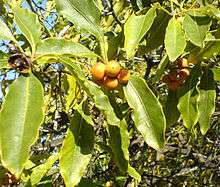Pittosporum undulatum
| Pittosporum undulatum | |
|---|---|
 | |
| Scientific classification | |
| Kingdom: | Plantae |
| (unranked): | Angiosperms |
| (unranked): | Eudicots |
| (unranked): | Asterids |
| Order: | Apiales |
| Family: | Pittosporaceae |
| Genus: | Pittosporum |
| Species: | P. undulatum |
| Binomial name | |
| Pittosporum undulatum Vent. | |
Pittosporum undulatum is a tree growing to 15m tall with wavy (undulating) leaf edges. It is sometimes also known as sweet pittosporum, native daphne, Australian cheesewood, Victorian box or mock orange. It carries conspicuous orange woody fruits about 1 cm in diameter for several months after flowering in spring or early summer.[1]
Originally Pittosporum undulatum grew in moist areas on the Australian east coast, where its natural range was from south-east Queensland to eastern Victoria,[2] but has increased its range since European settlement. It is a fast grower, and has become a weed in other parts of Australia where it is not indigenous. It is also highly invasive in South Africa, the Caribbean, Hawaii, the Azores and southern Brazil.[3][4]
The earliest known record (according to the Australian Virtual Herbarium) is from Port Jackson, Sydney, in 1803.[2] However, P. undulatum's status around the Sydney area is contentious.[5] Even though it is native to the region, P. undulatum has spread to soils and bushland where it wasn't found before European settlement, often out-competing other plants. It has done especially well in areas where the environment has been altered by humans - for example by habitat fragmentation weakening other natives, by fertilizer runoff from homes increasing soil nutrients and by the suppression of bushfires near suburbs. Unlike most natives, P. undulatum takes advantage of high nutrient levels and its seeds can germinate without needing fire. This has led to the species sometimes receiving the "invasive" label although some think that it is merely returning to areas where it grew before people arrived in Australia and began burning the environment far beyond that which previously occurred.
Recommended control measures have included the identification and selective removal of female trees to prevent spread, as well as careful burning, where possible, together with follow-up weeding.[2]
Images
.jpg) Detail of flowers.
Detail of flowers. Pittosporum undulatum ca 1860
Pittosporum undulatum ca 1860.jpg) P. undulatum in the Oxley Wild Rivers National Park
P. undulatum in the Oxley Wild Rivers National Park
References
- ↑ http://www.hear.org/Pier/wra/pacific/pittosporum_undulatum_htmlwra.htm
- 1 2 3 Gleadow, Ros; Walker, Jeff (May 2014). "The invasion of Pittosporum undulatum in the Dandenong Ranges, Victoria: realising predictions about rates and impact". Proceedings: Fifth Victorian Weeds Conference. Retrieved 10 May 2016.
- ↑ "Pittosporum undulatum in southern Brazil" (PDF). Instituto Hórus. Retrieved 2009-06-18.
- ↑ "Pittosporum undulatum in the Azores, Portugal" (PDF). Universidade dos Açores. Retrieved 2009-06-18.
- ↑ Pittosporum undulatum - Traitor or Survivor? (pdf file)
External links
- PlantNET New South Wales Flora Online: Pittosporum undulatum
- Rose, S (1997). "Influence of suburban edges on invasion of Pittosporum undulatum into the bushland of northern Sydney, Australia". Austral Ecology. 22: 89. doi:10.1111/j.1442-9993.1997.tb00644.x.
- Ecology of Pittosporum undulatum (pdf file)
- Australian Plants: Pittosporum undulatum